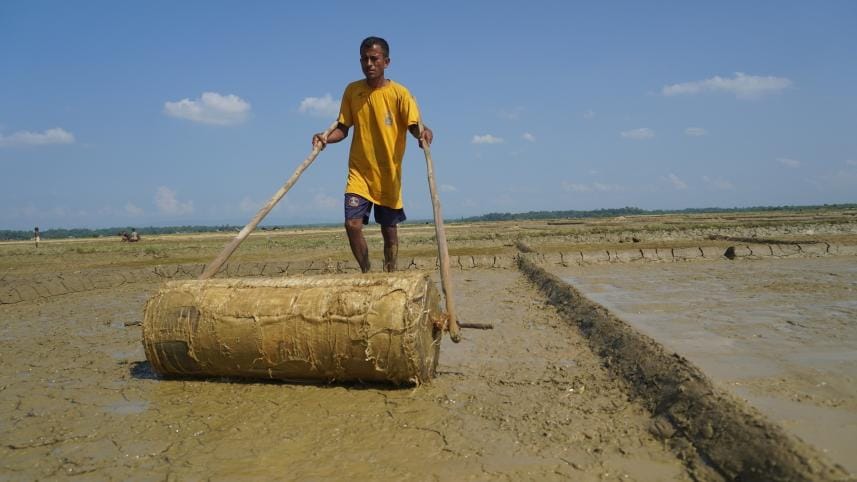Salt farmers prepping early this year in hopes of higher profit

Salt farmers in Chaufaldandi union under Cox's Bazar sadar upazila are preparing their fields early this year as they aim to secure higher profits before imports potentially dampen the market.
"The price of salt is very profitable for now and so, I will try to harvest early," said Shahadat, a salt farmer in Uttarpara village of Chaufaldandi union.
Farmers in Cox's Bazar are currently selling unrefined salt for up to Tk 700 per maund (37 kilogrammes) but the price will fall drastically when the typical cultivating period starts next month.
With this in mind, Shahadat has been working hard under the scorching sun even though the risk of rain in days ahead threatens to delay cultivation by as much as 15 days.
"As my land is high and leaves no option for aquaculture, I cannot afford to keep myself idle. So, I am preparing my field for salt cultivation," he said.
Shahadat added that is it difficult to maintain his family expenses amid the rising price of daily essentials and so, some early income this season could help ease the burden.
Asked for his thoughts on how allowing imports of salt could impact his income, Shahadat said it would immediately decrease the price of the key cooking ingredient.
"And if the price is reduced, then we will only get enough money for our labour alone," he added.
Likewise, a number of other salt farmers in the village said they would incur huge losses if the government allows traders to import salt.
Nurul Amin, a local salt farmer, said landowners have doubled their leasing prices to Tk 1,000 per decimal after seeing that salt farming has turned profitable.
As such, farmers will have to spend more than Tk 90,000, including the cost of labour and other inputs, to cultivate salt on 40 decimals of land throughout the six-month dry season beginning in November.
Farmers usually get up to 300 maunds of salt from 40 decimals of land each season and so, they have to incur losses if the price is below Tk 350 per maund.
Last season, farmers sold their salt for Tk 400 to Tk 450 per maund during the main cultivating period.
"But once the government allows imports, the price of salt will fall below Tk 350 per maund," he added.
Other local farmers, such as Selim Ullah and Monirul, said they are always deprived of fair prices as even in absence of imports, middlemen make sure to undercut the cost.
For example, they take as much as 65 kilogrammes of salt and count it as one maund, they said.
Manjur Alam, extension officer of the Cox's Bazar Salt Industries Development Office of the Bangladesh Small and Cottage Industries Corporation, said the government's move to import 1 lakh tonnes of salt will not harm the local price.
"This is because the amount to be imported can only cater to demand for 15 days," he added.
Last year, salt production in Cox's Bazar and Banshkhali upazila of Chattogram stood at 22.33 lakh tonnes against demand of 23.85 lakh tonnes.
"Most of the salt produced in Bangladesh is cultivated in those two regions," Alam said.




 For all latest news, follow The Daily Star's Google News channel.
For all latest news, follow The Daily Star's Google News channel.
Comments